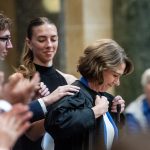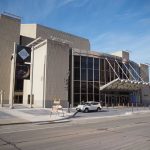The Lionheart ensemble in glorious polyphonic sound

Lionheart: l to r: John Olund – tenor, Kurt-Owen Richards – bass, Jeffrey Johnson – baritone, Lawrence Lipnik – counter-tenor, Richard Porterfield – baritone and Michael Ryan-Wenger – tenor.
Saturday night, amid the vastness of the Basilica of St. Josaphat, it was often difficult to discern the individual contributions of the six beautifully blended male voices of the Lionheart a capella ensemble. The sound fell upon the ear as a complex but unified whole.
Early Music Now presented the a capella sextet in Tydings Trew: Feasts of Christmas in Medieval England. In contrast to other Early Music Now events, this concert was not a broad period survey but an immersion into 15th century religious observance focused on the birth of Christ, starting with the Annunciation and ending with the Epiphany.
Lionheart began and ended by singing from the hallway behind the audience. During the concert, they moved to different locations to exploit the effects of the room. They occasionally organized in separate groups of three to create contrasting blends. At one especially effective moment, a baritone and tenor sang from opposite edges of the dome overhead, causing resonant sound to rain down upon those in the center.
St. Josephat’s Basilica is a performance destination during the Christmas season. This unique place supplies the ambiance, but a performing group must dodge its acoustical traps. The room is nearly perfect for chant. Lionheart’s Medieval music, without the broad variance in dynamics, push and pull of dissonance and consonance, or faster pace of later music makes it a good fit for the Basilica’s long acoustical decay. At times, Lionheart sang so softly that the hall did not serve it. At full volume, the voices rang through the Basilica and their the tones held as though a sustain pedal were depressed, and the room mixed the sound to create a marvelous unified voice. (Even the resident bat was roused to fly high about the room.)
Some highlights: In three carols – Nowel, Nowel, Worcepe we this holy day and the familiar Lully Lula – relaxed rhythms and melodic lines made for a more celebratory mood. In the hymn Sancte dei preciose, three singers sang the melody and the others – standing apart – introduced sustained tones that grew to an organ pedal drone by the third verse. The hymn Ave Rex angelorum introduced rich independent melodies tightly woven together.
The group sang a short encore – In a Bleak Mid-Winter. This much later secular work provided more evidence of how well the ensemble harmonizes. But it also reminded us, by contrast, of the unique beauty and complexity of polyphonic music that made up the rest of the concert.
With such extraordinary ensemble singing, it is difficult and perhaps less appropriate to single out voices. But some variations in assignments permit a distinction. Lawrence Lipnik’s counter-tenor offered a tender overlay floating above many selections. John Olund’s pure tenor voice rang out when he was assigned solo lines. Kurt-Owen Richards’s smooth baritone fit well under most any melody.
Lionheart comprises Lipnik, Olund, tenor Michael Ryan-Wenger, baritones Jeffrey Johnson and Richard Porterfield and bass Kurt-Owen Richards. As usual, informative program notes can be downloaded from the Early Music Now website.



















